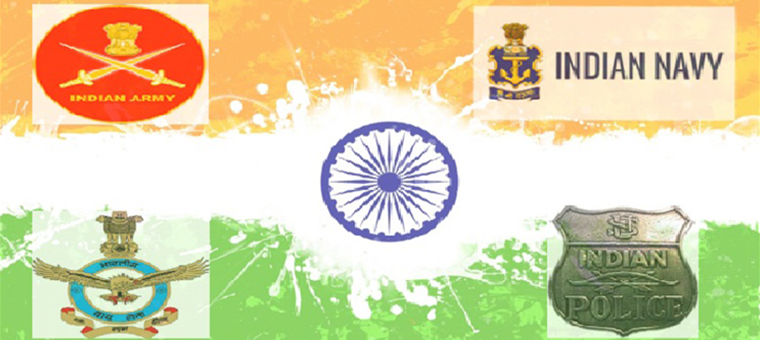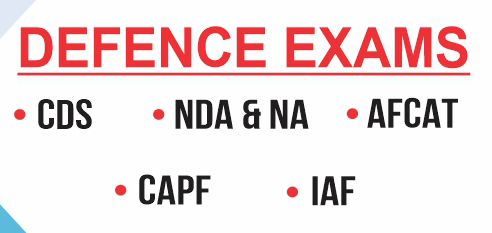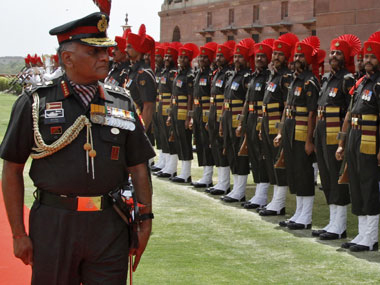How to Prepare for Defence Exams in 2020
Posted by: Admin | 5 May 2020

In education, an examination is just test to show the knowledge and ability of a student and it is not the scorecard of a person’s personality. But it is necessary to take examinations for a cross check whether our learning is going in the right direction or not. So, in this article I will be putting light on the examination which is held nation-wide, Defence examinations. Around 4 lakhs of candidates appear each year for defence exam.
The defence services offer dignified, prestigious and lucrative career opportunities. As a part of the defence services, one can serve in the Army, Navy or Air Force on combat duty, on administrative assignments, in the medical services, engineering services, in the JAG’s Department, or in the Education Corps. This exam is held under various categories like:-
- NDA
- CDS
- AFCAT
- CAPF
- Indian Coastal Guard
- Territorial Army
Now let us understand what these terms are.
- NDA - NDA is conducted for admission to the army, navy and air force wings of NDA and Indian Naval Academy Course (INAC). The exam is conducted offline twice a year. The exam comprises two stages - written exam and SSB Interview.
- CDS - Combined Defence Services (CDS) Examination is conducted by Union Public Service Commission (UPSC) twice a year for admission. Selection of candidates are done based on written exam and SSB Interview.
- AFCAT - The Air Force Common Admission Test (AFCAT) is conducted by the Indian Air Force. The exam is held twice a year in February and August, respectively, to select Class-I Gazetted Officers in Flying and Ground Duties (Technical and Non-Technical). Candidates are selected based on their performance in online exam and Air Force Selection Board (AFSB) Interview.
- UPSC CAPF - The Central Armed Police Forces (Assistant Commandants) Examination is conducted by Union Public Service Commission (UPSC). The exam is held for recruitment of recruitment of Assistant Commandants (Group A) in the Central Armed Police Forces (CAPF) such as Border Security Force (BSF), Central Reserve Police Force (CRPF), Central Industrial Security Force(CISF), Indo‐Tibetan Border Police (ITBP) and Sashastra Seema Bal (SSB).
- Indian Coast Guard - Indian Coast Guard is conducted for recruitment of Navik (General Duty), Yantrik and Assistant Commandant. The selection process of Yantrik and Navik includes written exam, physical fitness test and medical exam.
- Territorial Army - The Territorial Army (TA) selects candidates as Jawan and Officers. The recruitment to the Officers is done for Civilians and Ex-Servicemen.

Exam Pattern
- Written Examination: The subjects of the written examination, the time allowed and the maximum marks allotted to each subject will be in the table below.
- Number of Papers: 2 (Maths and General Ability Test)
- Questions Type: Objective
- Marking Scheme: Candidates should note that there will be Penalty (Negative Marking) for wrong answers marked by a candidate in the objective type questions.
- SSB Test / Interview : 900 marks
Syllabus
Mathematics:
- Algebra, Matrices and Determinants
- Trigonometry, Analytical Geometry of Two and Three Dimensions
- Differential Calculus, Integral Calculus and Differential Equations
- Vector Algebra, Statistics and Probability
Syllabus for General Ability Test
- Part A- English
- The English portion of the entrance test is designed in a way to judge a candidate's knowledge of the basic grammar and vocabulary.
- It judges a candidate’s ability to form correct sentences and use of words.
- The syllabus of the English paper ranges from various aspects like the knowledge and usage of grammar, vocabulary, comprehension, and his mental ability to remember and place the meaning of words in their proper places.
- Marks allotted to this section are 300.
- Part B- English
- General Knowledge
- The question paper on General Knowledge will cover current affairs, questions from Physics, Chemistry, General Science, Social Studies, Geography and Current Events. NDA syllabus of each topic is given below. The paper aims to check knowledge and intelligent understanding of the subject.
Physics Section:
- States of Matter and its properties, Light and Sound (properties)
- Motion and Laws of Motion, Magnet and its properties
- Work, Energy and Power, Current and Electricity
- Modes of Transfer of Heat and its effect, General Principles of Working of Simple Pendulum, Pulleys, Siphon, Levers, Balloon, Pumps, Hydrometer, Pressure Cooker, Thermos Flask, Gramophone, Telegraphs, Telephone, Periscope, Telescope, Microscope, Mariner’s Compass; Lightening Conductors, Safety Fuses
Chemistry Section:
- Physical and Chemical Changes, Properties of Oxygen, Hydrogen etc. with Oxidation and Reduction
- Air and Water (properties), Carbon and its forms
- Chemical equations and Laws of Chemical Combination Atom and its structure (details)
- Elements, Compounds and Mixtures, Fertilizers
- Acid, Bases and Salts, Use of materials for preparation of different chemicals
General Science Section
- Basic Unit of Life: Cell, Reproduction in Plants and Animals
- Living and Non-Living Things, Human Body and Life processes
- Epidemics: causes and preventions, Food and Balanced Diet
- Elements, Compounds and Mixtures, Fertilizers
- Solar System, Achievement of Eminent Scientists
History Section
- Indian History: Culture and Civilisation, Constitution and Administration of India
- Nationalism in India, Government of India at various levels
- Five Year plans of India, Renaissance and Discovery
- French, Russian and Industrial Revolution, United nations and Concept of one world
- Democracy in India, Teachings of Mahatma Gandhi
Geography Section
- Earth and its Origin and Movement (latitudes and longitudes), Tides and Oceanic Currents
- Rocks and Its classification, Atmosphere and Atmospheric Pressure
- Types of Climate, Regional Geography of India
- Agricultural and Industries, Transportation and Trading routes of India
- Imports and Exports of India
Current Affairs Section
- Important and Recent Events in India, Current and Important World Events
- Important Indian or Non-Indian Personalities related to Cultural Activities and Sports

Eligibility Criteria
Nationality
- A citizen of India or
- A subject of Nepal or
- A subject of Bhutan
- A Tibetan refuge
- Candidates must have born not earlier than July 2, 2001 and not later than July 1, 2004.
- The commission will accept the date of birth that is entered in the Class 10 or 12 certificate.
- Candidates need to submit these certificates after the declaration of the result of written exam.
Strategy
After knowing the syllabus, the vital thing that comes to mind is how to strategize our studies.
- Have proper planning for the whole day and divide the time into different sections where you can devote time to all the sections equally.
- There should be an adequate timetable which should be followed religiously.
- You should know your weak and strong points do that you can devote time accordingly.
- Make the best use of all the available online resources.
- Be updated with all the general knowledge. Do maintain notes if the events that are happening worldwide. And keep an eye on the economy too. This not only increases our awareness but also helps us in enhancing our verbal skills too.
- Download previous years question papers because nothing can be much more beneficial than them.
- Do make short notes of the content which you have read to have a perfect last-minute revision.
- To enrol in a test series that will help in keeping pace with time.
So, keep practising, and then nothing can stop you!!